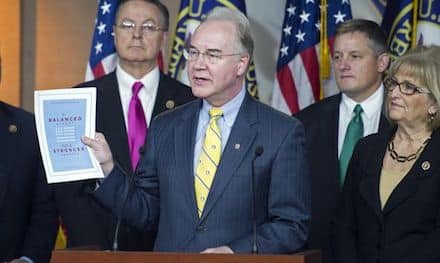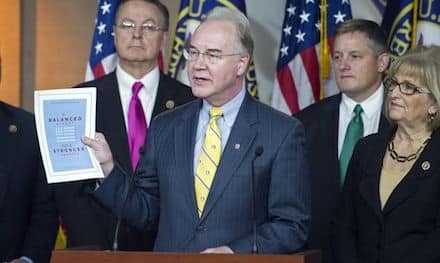Today, the House of Representatives will vote on the Fiscal Year 2016 budget. As is custom, there will be a series of votes on various substitute budgets, including substitutes offered by the Congressional Black Caucus, the Progressive Caucus, the Democratic Leadership, and the conservative Republican Study Committee.
There will also be two official Republican budgets….why two? Because the budget passed out of the House budget committee “only” spends $613 billion on defense in FY2016 and “only” increases defense spending by $387 billion over ten years. So Republicans on the House Millitary-Industrial Complex (oops…I mean Armed Services) Committee threatened to vote against the rule unless the House leadership increased defense spending.
So the House Republican leadership prepared another budget with an additional $2 billion in Overseas Contingency Operations (OCO) funding. This new budget will be voted on last. Under the Queen of the Hill rule the House is using, the budget that gets the most votes will be the official House budget.
Politico has an interesting story about how the continued reliance on OCO to get around the budget caps has created a permanent war slush fund.
National Journal examines how an eleven-line provsion in the Senate budget, creating a “Deficit-Neutral Reserve Fund to Strengthen America’s Priorities” could lead to increased spending in all areas. As the article points out, in order to increase defense spending, GOP defense hawks in the Senate are going to have to cut a deal with liberal Democrats to increase domestic spending.
Nick Gillespie at Reason Magazine crunches the numbers and finds not much difference between the GOP’s budget and President Obama’s:
If Milton Friedman was right to say that the ultimate cost of government is the amount of money it spends, then here is the choice we are faced with in 2016 so far: The president wants to spend the equivalent of 21.3 percent of GDP while the GOP House wants to spend 20.3 percent.
Over the next decade, if the president got his way, we’d have average spending of 21.7 percent of GDP each year. The GOP would trim that to just 18.8 percent of GDP, which is a much smaller number and a not particularly convincing one. Under the first four years in the Bush years, after all, when the GOP held the White House and both house of Congress, the government spent 19.1 percent, 19.7 percent, 19.6 percent, and 19.9 percent of GDP.
Reprinted with permission from Campaign for Liberty.


